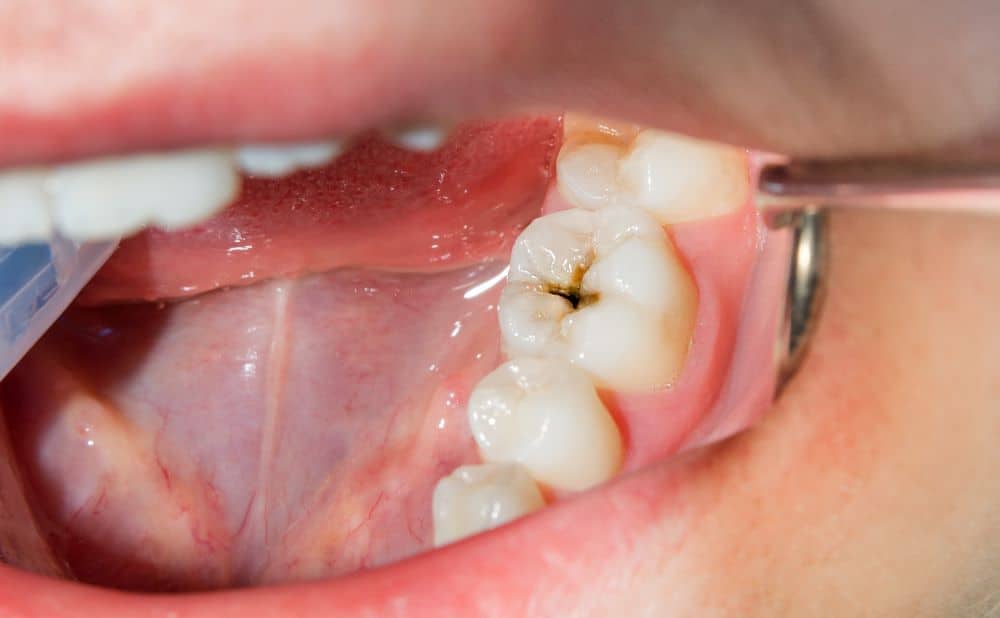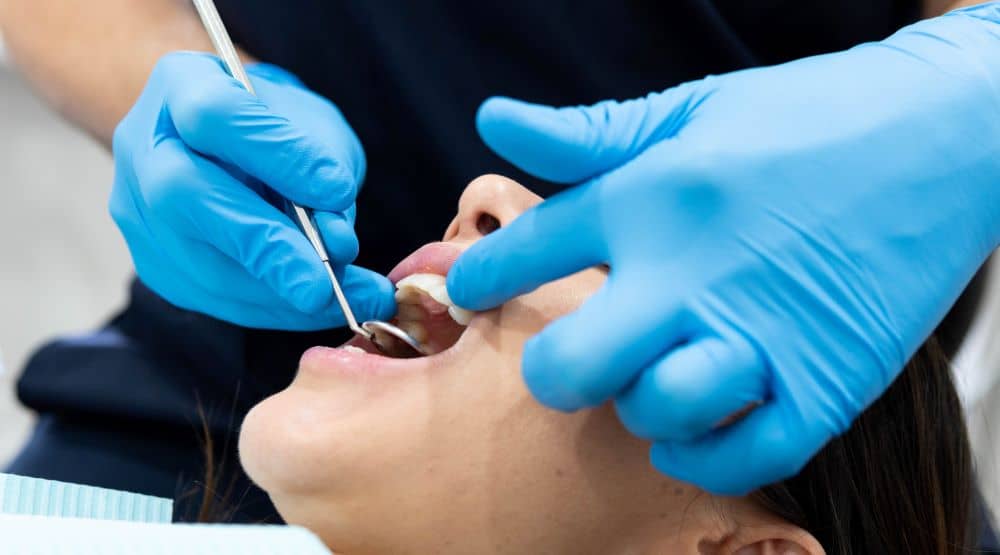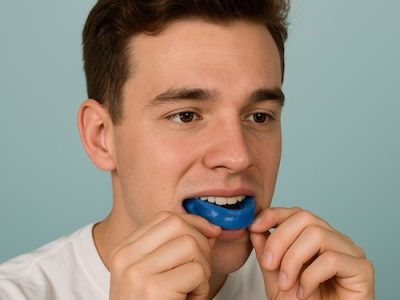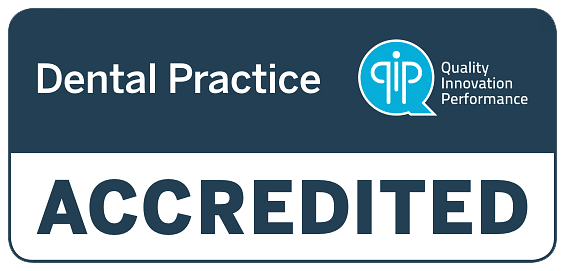A recent study by the University of Adelaide found that a third of the Australian population has tooth decay. Worse, those cavities are left untreated because people avoid going to the dentist. It’s puzzling, considering a dental appointment is only once or twice a year.
Tooth decay is a pesky problem, but it is not the only one that causes tooth pain. In some individuals, it is hard to pinpoint the exact cause of the problem. That’s why the best way to deal with toothaches is to simply visit a dentist. The dental professional will diagnose the condition to understand the root of the pain, which allows for treatment planning.
Quick Summary: 8 Types of Tooth Pain
- Sharp Tooth Pain
- Toothache
- Sensitivity
- Persistent Pain
- Pain When Chewing
- Back of Mouth
- Inflamed Gums
- Pain That Radiates the Jaw
When Should You See a Dentist?
Toothaches are often simple and may go away. However, if the pain is severe and it lasts for more than one or two days, it’s time to visit your dentist. You should also book an appointment if you experience earaches, have a fever, or feel pain when you open your mouth wide.
What if you can’t go to the dental office? It’s helpful to know the different types of tooth pain. In this post, we list eight types of tooth pain. We’ll give you the signs to watch out for and what you can do to feel relief.
1. Sharp Tooth Pain
If you have tooth decay, chances are you feel this sharp pain when you drink or eat something cold. It’s a recognisable type of pain because it can cause you to stop whatever you’re doing. You end up putting your hand on your cheek where you just felt the discomfort. It usually takes just a few seconds to about a minute, and then you may begin feeling better. That is until you consume cold beverages or food again.
But tooth decay is not the only culprit. If you have a broken cusp or there is a space between your fillings or crowns, you’ll feel the same sharp pain. People with bruxism or those who grind or clench their teeth, particularly while asleep, can also experience sharp tooth pain.
When you chew, you may feel similar discomfort that can take you by surprise. You know it’s a sharp pain when it does not linger, but it usually happens in short durations. Sometimes, however, ignoring the pain can lead to a dull throbbing that does not seem to go away. That’s when you may have to book an appointment. When you go to the dentist, the treatment can vary depending on your case. Usually, it involves any of the following:
- Repairing the broken cusp using an onlay
- Applying a crown for the fractured cusp
- Adjusting a wrongly placed crown or filling
You can try some home remedies first if you cannot go to the dentist immediately.
Here are some ideas:
- Rinse your mouth with saltwater, which will help reduce inflammation. If there are oral wounds that you may be unaware of, this treatment may sting a little.
- An alternative to salt is hydrogen peroxide. It is known for its ability to kill bacteria and even help reduce plaque. It’s vital that you properly dilute the solution by mixing three per cent hydrogen peroxide with the same amount of water. Rinse your mouth with the concoction just like you would with a mouthwash.
- Use a cold compress to relieve the pain you’re feeling for about 20 minutes. If the pain persists, repeat the process once every few hours.
- Crush a garlic clove and apply the paste on the tooth, causing sharp pain. You can also add a very small amount of salt. You can also choose to chew a fresh garlic clove.
Talk to your dentist first if you’re pregnant or breastfeeding or with a medical condition. Some people are sensitive to certain ingredients, including treatments that use herbs.
2. Toothache
Toothache is an umbrella term that covers all forms of tooth pain. It can be intermittent and sharp like above, but it can also give severe pain that lingers. If you’re experiencing tooth pain, whether it is mild or serious, you can try the following to alleviate the discomfort:
- Avoid acidic and sugary drinks and foods.
- Don’t drink or eat anything too hot or too cold
- Don’t skip cleaning your teeth by brushing and flossing
- When sleeping, use more pillows, so your head is slightly elevated. It helps lower pressure on the achy tooth.
You can also take ibuprofen or other pain relief medications that you typically use. The mentioned home remedies above for sharp tooth pain may help you with your toothache.
3. Sensitivity
If you feel pain when you drink or eat something hot or cold, you probably have sensitive teeth. It happens even when it’s just a sip, and you feel the pain that lasts for a few seconds. People tend to ignore this problem because it quickly goes away. However, there could be something wrong with your teeth, mouth, or oral health – or all of the above.
The most common causes for sensitivity are:
- Tooth decay
- Loose feeling
- Exposed tooth root
- Tooth abrasion
- Receding gums
All the conditions mentioned can make your teeth vulnerable to pain. If you think you have sensitive teeth, one of the things you can do is to use a softer brush. Avoid brushing too hard since it can damage your teeth and gums more. Also, find a toothpaste product that’s specially made for people with sensitive teeth. It’s advised not to brush more than twice a day until the problem stops. You must book an appointment even if the sensitivity does not linger.
If you want to learn more about tooth sensitivity, please read this blog post.
4. Persistent Pain
What if the pain does linger? Does it mean your sensitivity is much worse? Usually, you feel pain for a brief moment before you can continue biting again. However, some people experience pain for more than a minute or two. It usually means that they have tooth decay that’s deeper than average. Others have an inflamed or swollen pulp, which leads to more prolonged sensitivity.
But one to two minutes of pain is not the longest. Some patients experience pain for an hour or more right after eating or drinking. That’s an incredibly long time, and often, the pain only gets worse. It happens when there is an abscess. If you feel pain for several minutes that lasts for an hour or two, make sure that you schedule an appointment as soon as possible.
For this type of severe, lingering pain, the solution is typically a root canal. Dead tissue is removed to stop affecting nearby teeth. The dentist will also cleanse your mouth, so bacteria are eliminated, and decay will not cause any more pain.
5. Pain When Chewing
You may have noticed that the tooth pain types described above are related to food or drink consumption. This next type of tooth pain is not about what you eat; rather, it’s when you eat. If you feel pain whenever you bite or chew, it may be due to tooth decay. Some report that they have a cracked tooth, which causes the pain. If you have a tooth infection or a loose filling, you could experience the same issue.
Again, you need to book an appointment because those causes for your tooth pain should be addressed by a dental professional. But while you are still at home and waiting for your visit, you can do the following:
- Chew on the side of the mouth that does not hurt.
- Don’t eat anything chewy, hard, and sweet.
- Make sure that you brush and floss regularly.
- You can also try the mentioned treatments above for tooth pain relief.
When you visit the dentist, the most common treatment is root canal therapy, especially if the problem is severe. If it is a simple issue, you probably need a filling or two. Many patients are scared of a root canal, perhaps because of the name of the procedure and why it is done. However, numerous people say that getting a filling is actually more uncomfortable.
6. Back of the Mouth
Do you feel some tenderness caused by the tooth (or teeth) at the back of your mouth? You’re most likely dealing with wisdom tooth pain. It’s a common problem in adults, and it is one of those that persist. Many people ignore it for a long time until it progresses and gets worse. The pain usually happens when the wisdom tooth is impacted. That means the tooth has not erupted, staying under the gum.
That impacted wisdom tooth will try its best to get out to the surface of the gum, though. As you can imagine, it causes severe pain while the tooth keeps pushing on the molars. It’s not always successful, leading to the tooth festering below your gums. The only solution here is to have the dentist remove the tooth. You can ask to have a low-impact surgery if it is possible for your situation.
In some cases, though, the tooth does not have to be removed. The dentist will examine it first and make sure that it will not cause any problem in the future. Even if the pain stops, surgery may still be required, especially if the tooth experiences other complications later on.
Suppose you’re pregnant or you cannot go to the dentist immediately. In that case, you can take over-the-counter pain relievers to help with toothache. You can also try rinsing with salt water, which can reduce the swelling of the gums.
Other home remedies that may be able to help are:
- Soak a small, clean cotton ball in peppermint extract. Peppermint is said to soothe pain and inflammation. You can apply the cotton ball to your gums. You can also rub the oil directly on the affected area.
- If you enjoy peppermint tea, you can use it as a mouth rinse. Let it cool down first before you wash your mouth with it.
- Aloe vera is a good option, especially for pregnant women. It is often safe and non-toxic for both the mother and the unborn baby. You can apply the gel on the teeth or gum where you feel the pain. The plant can cool the area, giving you temporary relief.
While many people swear by the effectiveness of the home remedies above, they usually only help temporarily. The best way to get rid of wisdom tooth pain is to have that problem tooth extracted by a dentist.
7. Inflamed Gums
When your gums are swollen, you can have tooth pain. One huge reason, which many people fail to consider, is brushing and flossing. Yes, you can hurt yourself when you’re brushing and flossing – too hard, that is. You can cause a mouth injury that will show in your gums. So, take the mirror test to inspect your gums. Do you see any redness, swelling, or even a hint of bleeding in your gum line? If you do, you could be applying too much pressure on your teeth and gums.
Usually, the inflammation can go away on its own. However, you need to make sure you stop brushing or flossing too hard. Rushing as if you are in a race can make the situation worse. Take your time with your oral hygiene. Use a toothbrush with soft bristles and floss with a product designed for sensitive gums. You can also use a water flosser, although it is not recommended to replace traditional flossing with it.
Apart from brushing too hard, swollen gums may be due to gingivitis, which is gum disease. You may not know you have it because the symptoms are often mild and can go away after several hours to a few days. However, when left untreated, gingivitis can progress to periodontitis, which is a more severe gum condition. It can also lead to tooth loss.
To prevent gingivitis from getting worse, you need to practice good oral hygiene every single day. You should also visit your dentist to know the extent of the problem.
Other possible reasons behind your swollen gums are not precisely related to your oral health. For example, pregnancy typically results in increased blood flow in the body, including the gums. Because of that, the gums are easily irritated when you brush and floss (or when you don’t).
Malnutrition, particularly vitamin B and C deficiencies, are known to cause gum swelling. Herpes, thrush, and other infections may also contribute to inflamed gums.
8. Pain That Radiates to the Jaw
Some patients complain about pain in their teeth that seem to move to their jaw and even their neck muscles. They are signs often associated with bruxism, which is when you grind your teeth unknowingly. It can happen during the day (awake bruxism) or when you’re sleeping at night (sleep bruxism). The latter is considered a form of sleep disorder, which is often a sign that the person has other sleep disorders like snoring and sleep apnoea.
In most instances, you do not need any treatment with mild clenching. However, your bruxism may be severe, causing severe issues, such as headaches and jaw problems. The most common symptom includes having damaged teeth that often look like you have been injured. There can be cracks or even chipping whose cause may be difficult for you to remember.
Other signs to look for are:
- A sudden increase in tooth sensitivity
- Exposed teeth’s deeper layers due to worn enamel
- Flattened teeth
- Tired jaw muscles
- Tightness in the jaw
- Locked jaw
- Face pain
- Soreness in the neck, jaw, and face
Your partner may notice that you grind your teeth at night because it is often loud enough for another person to hear. It’s essential to see your dentist if you have the signs above. Treatment will depend on the cause and extent of the teeth damage. Often, a splint or mouth guard will be provided to avoid grinding the teeth. Reshaping teeth can also be a solution, especially if certain teeth have become too sensitive to chew.
While you are waiting for your dental appointment, it helps reduce stress, which is one of the causes of sleep disorders like bruxism. You can take a warm bath, listen to music, and ensure you get enough sleep each night. Avoid drinking coffee or any other stimulants, as well as alcohol before bedtime. Not only do these beverages cause you to be jittery and restless, but they can also wake you up in the middle of the night because of a full bladder.
And there you have it, the eight types of tooth pain and what you can do at home. Don’t forget to schedule your next appointment to have the toothache checked. Even if it went away, you should still have your dentist perform an exam to determine the cause and proper treatment for the pain should it reoccur.











